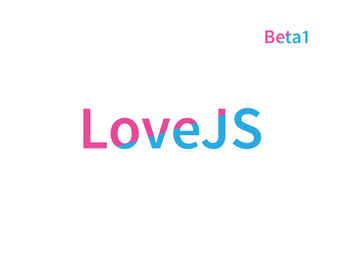
LoveJS Player
LoveJS Player
Yet another lovejs player. This player is based on Love 11.5 and Emscription 3.1.68. It outputs a single html file that contains the engine and game you pass in.
Parameters
You can parameterize the output file by providing lovejs.json in the top level of your .love file
You can customize the HEIGHT and WIDTH of the default html shell using the appropriate tags, or you can provide your own custom html shell.
Note that if you are passing in your own html shell or style sheet those files should be present in your .love file and their paths should be provided by STYLE_FILE and HTML_FILE.
Currently only love115-compat-beta1 is the only available version of love.
Recommendations on further customizable parameters are welcome.
{
"TITLE":"Your Game",
"WIDTH":1280,
"HEIGHT":720,
"VERSION":"love115-compat-beta1",
"STYLE_FILE":"/path/to/style.css",
"HTML_FILE":"/path/to/index.html"
}
Extensions
This bundler extends Love2D to accept incoming signals from the JS environment.
JS: love_send_event
Sending Signals from JS to Lualove_send_event(key-string,value-string, value-number) => nil
To create an event "key" with arguments "value" and 10 call the following from javascript.
Note the types are fixed, the first two variables must be strings and the last must be a number. This is a limitation of the SDL_UserEvent struct. This may be ameliorated in the future by replacing the event integration with polling.
LoveState['love_send_event']("key","value",10)
On the love2d side you can catch this event using an event handler
function love.handlers.key (value, code)
print(value)
print(code)
end
Lua: js.call
Calling JS from Lua, no returnsjs.call(js-string) => nil
You can use js.call to execute a js string. No return value is provided. Coupling this with love_send_event lets you create asynchronous callbacks into the js environment.
Be careful, there are no checks on the string being executed. Errors may crash your game.
-- js is preloaded so it can be required anywhere
local js = require ("js")
js.call("console.log(\"hello\");")
Lua: js.send-event
Send event to canvas in JS environmentjs["send-event"](event-name-string) => nil
js["send-event"] sends an event that can be picked up by event listeners attached to the canvas element. No return value is provided. Coupling this with love_send_event lets you create asynchronous callbacks into the js environment.
-- js is preloaded so it can be required anywhere
local js = require ("js")
js["send-event"]("game-start")
function gameStartEvent (_e){
console.log("Game Start!");
}
LoveState["canvas"].addEventListener("game-start",gameStartEvent);
Lua: js.send-custom-json-event
Send event to canvas in JS environment with a custom json objectjs["send-custom-json-event"](event-name-string, json-string) => nil
js["send-custom-json-event"] sends an event that can be picked up by event listeners attached to the canvas element. A custom json object will be available under the events detail key. No return value is provided. Coupling this with love_send_event lets you create asynchronous callbacks into the js environment. You must format the outgoing json-string as json or there will be an error in the JS environment.
-- js is preloaded so it can be required anywhere
local js = require ("js")
-- load your own json library
local json = require ("lib.json")
local message = {}
message["name"] = "Test Name"
js["send-custom-json-event"]("game-start",json.encode(message))
function gameStartEvent (e){
console.log(e.detail.name);
}
LoveState["canvas"].addEventListener("game-start",gameStartEvent);
Lua: websocket.supported
Check if websockets are supportedwebsocket.supported() => bool
Lua: websocket.new
Open a new websocketwebsocket.new(handle-string, address-string) => WS
Lua: websocket.deinitialize
websocket.deinitalize() => nil
Lua: WS.send_utf8_text
Send a string over the websocketWS:send_utf8_text(utf8text-string) => nil
Lua: WS.send_close
Send close event over the websocketWS:send_close(code-number,reason-string) => nil
Lua: WS.delete
Delete websocketWS:delete() => nil
Lua: WS.get_protocol
Get the websocket protocolWS:get_protocol() => string
Lua: WS.get_url
Get websocket connected URLWS:get_url() => string
Lua: WS.get_extensions
Get websocket extensionsWS:get_extensions() => string
Lua: WS.get_ready_state
Get websocket ready stateWS:get_ready_state() => number
Websocket Events
Receiving signals via websocketsWS:get_ready_state() => number
Incoming websocket events are passed into Love2D via the event system.
There are four events passed in, websocketmessage, websocketopen, websocketerror, and websocketclose. Each event passes in a message (string) and a code (number). Write your own handlers to handle these incoming events.
The handle string passed to websockets.new will prepend the name of the four events generated by the websocket system.
-- websocket is preloaded so may be required anywhere
local websocket = require("websocket")
-- create a new websocket with handle "myhandle-" connected
-- to the your localhost port 9000
local WS = websocket.new("myhandle-","ws://localhost:9000")
love["handlers"]["myhandle-websocketopen"] = function (message)
print(message) -- message for websocketopen should always be an empty string
WS.send_utf8_text ("connected!!")
end
love["handlers"]["myhandle-websocketmessage"] = function (message)
print(message) -- incoming message from server
end
love["handlers"]["myhandle-websocketclose"] = function (message)
print(message) -- json formatted message to be parsed
end
love["handlers"]["myhandle-websocketerror"] = function (message)
print(message) -- message from websocketerror is an empty string.
end
| Status | In development |
| Category | Tool |
| Platforms | HTML5 |
| Rating | Rated 4.7 out of 5 stars (3 total ratings) |
| Author | Alex ☕🇨🇦 |
| Made with | LÖVE |
| Tags | html5, LÖVE, software |
| Code license | MIT License |
| Asset license | Creative Commons Attribution_ShareAlike v4.0 International |
| Links | Source code |
